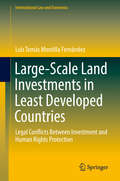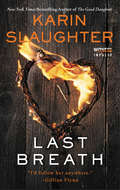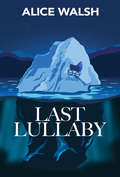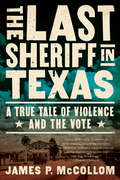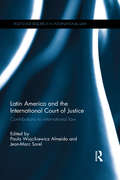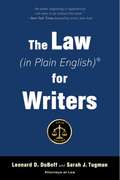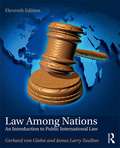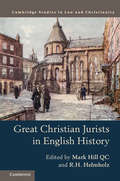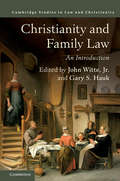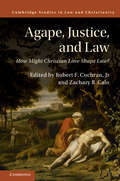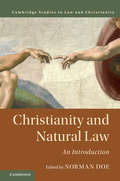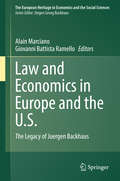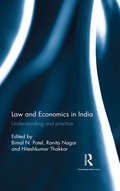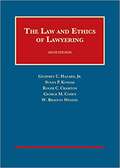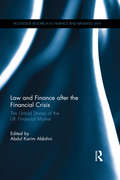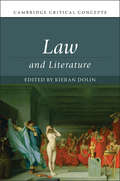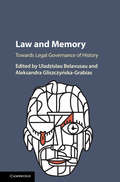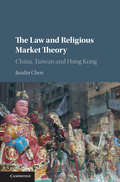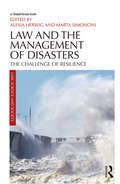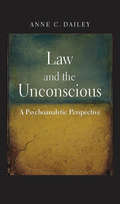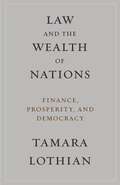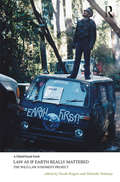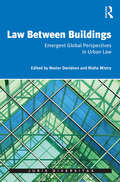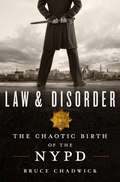- Table View
- List View
Large-Scale Land Investments in Least Developed Countries: Legal Conflicts Between Investment and Human Rights Protection (International Law and Economics)
by Luis Tomás Montilla FernándezThis book analyses large-scale land investments for agricultural purposes in Africa’s least developed countries from a law and economics perspective. Focusing on the effects of foreign land investments on host countries’ local populations and the apparent failure of international law to create incentives to offset them, it also examines the legal and economic mechanisms to hold investors accountable in cases where their investment leads to human rights violations. Applying principal agent and contract theory, it elucidates the sources of opportunism and develops control mechanisms to ameliorate the negative effects. It shows that although judicial mechanisms fail to deliver justice, international law offers alternatives to safeguard against arbitrary and abusive state and investor conduct, and also to effectuate human rights and, thus, tackle opportunistic behaviour.
Last Breath
by Karin SlaughterProtecting someone always comes at a cost.At the age of thirteen, Charlie Quinn’s childhood came to an abrupt and devastating end. Two men, with a grudge against her lawyer father, broke into her home—and after that shocking night, Charlie’s world was never the same.Now a lawyer herself, Charlie has made it her mission to defend those with no one else to turn to. So when Flora Faulkner, a motherless teen, begs for help, Charlie is reminded of her own past, and is powerless to say no.But honor-student Flora is in far deeper trouble than Charlie could ever have anticipated. Soon she must ask herself: How far should she go to protect her client? And can she truly believe everything she is being told?Razor-sharp and lightning-fast, this electrifying story from the #1 international bestselling author will leave you breathless. And be sure to read Karin Slaughter’s extraordinary new novel The Good Daughter—available August 22, 2017.
Last Lullaby
by Alice WalshA debut mystery of small-town intrigue from the award-winning author. &“Gripping . . . a satisfying and nicely-paced page turner.&” —The Telegram Set in the fictional town of Paddy&’s Arm, Newfoundland, Alice Walsh&’s debut mystery novel is at once harrowing and homey, equal parts police procedural and diner gossip. When Claire and Bram&’s only child dies suddenly, it at first appears to be a case of crib death. But when the real cause of death indicates homicide and Claire is arrested as the number-one suspect, her friend, lawyer Lauren LaVallee, promises she&’ll do everything she can to prove Claire&’s innocence. As Lauren combs Paddy&’s Arm for suspects, amid department politics and small-town talk, leads abound. Why are professors Frances and Annabelle being so secretive about their adopted daughter? What&’s behind a troubled student&’s sudden disappearance? And who is the mysterious platinum blonde observed at the scene of the crime? Meanwhile, Lauren&’s own secret—a case that almost cost her her career back in Montreal—and the sudden return of an ex-lover who wants back in her life, threaten to overwhelm the investigation altogether. &“Alice Walsh manages to throw in a variety of plot-points that are rather unique to the genre and which don&’t normally tend to appear in mystery/thrillers; adding another layer to the story, making it stand out from its peers and adding a touch more gossipy intrigue and excitement.&” —Reminders of the Changing Time
The Last Sheriff in Texas: A True Tale of Violence and the Vote
by James P. McCollom"[A] narrative with resonance well beyond seekers of Texas history. The Last Sheriff in Texas would be an amazing allegory for our times, were it fiction. Instead it suggests cultural trenches that we view as new that were dug decades ago." —Houston ChronicleBeeville, Texas, was the most American of small towns—the place that GIs had fantasized about while fighting through the ruins of Europe, a place of good schools, clean streets, and churches. Old West justice ruled, as evidenced by a 1947 shootout when outlaws surprised popular sheriff Vail Ennis at a gas station and shot him five times, point–blank, in the belly. Ennis managed to draw his gun and put three bullets in each assailant; he reloaded and shot them three times more.Time magazine&’s full–page article on the shooting was seen by some as a referendum on law enforcement owing to the sheriff&’s extreme violence, but supportive telegrams from all across America poured into Beeville&’s tiny post office. Yet when a second violent incident threw Ennis into the crosshairs of public opinion once again, the uprising was orchestrated by an unlikely figure: his close friend and Beeville&’s favorite son, Johnny Barnhart.Barnhart confronted Ennis in the election of 1952: a landmark standoff between old Texas, with its culture of cowboy bravery and violence, and urban Texas, with its lawyers, oil institutions, and a growing Mexican population. The town would never be the same again.The Last Sheriff in Texas is a riveting narrative about the postwar American landscape, an era grappling with the same issues we continue to face today. Debate over excessive force in law enforcement, Anglo–Mexican relations, gun control, the influence of the media, urban–rural conflict, the power of the oil industry, mistrust of politicians and the political process—all have surprising historical precedence in the story of Vail Ennis and Johnny Barnhart.
Latin America and the International Court of Justice: Contributions to International Law (Routledge Research in International Law)
by Paula Wojcikiewicz Almeida Jean-Marc SorelThis book aims to evaluate the contribution of Latin America to the development of international law at the International Court of Justice (ICJ). This contemporary approach to international adjudication includes the historical contribution of the region to the development of international law through the emergence of international jurisdictions, as well as the procedural and material contribution of the cases submitted by or against Latin American states to the ICJ to the development of international law. The project then conceives international jurisdictions from a multifunctional perspective, which encompasses the Court as both an instrument of the parties and an organ of a value-based international community. This shows how Latin American states have become increasingly committed to the peaceful settlement of disputes and to the promotion of international law through adjudication. It culminates with an expansion of the traditional understanding of the function of the ICJ by Latin American states, including an analysis of existing challenges in the region. The book will be of interest to all those interested in international dispute resolution, including academic libraries, the judiciary, practitioners in international law, government institutions, academics, and students alike.
The Law (In Plain English)
by Leonard DuBoff Sarah Tugman“No writer, beginning or experienced, will want to be without this book.” —Jean Auel, #1 New York Times bestselling author of The Clan of the Cave Bear and the Earth’s Children series A career as a writer involves much more than the act of writing itself. In The Law (in Plain English) for Writers, Fifth Edition, Leonard DuBoff and Sarah Tugman proffer invaluable advice for the myriad legal and business facets of being a writer. Readers will discover how to succeed in every area affecting a writer's livelihood, such as submissions, dealing with agents, taxes, permissions, royalties, alternatives to mainstream publishers, copyright, book and magazine contracts, and how to prevent disputes. This newly revised edition, keeping up with the changing legal landscape, contains information on a variety of legal issues pertinent to writers of all types, including: Updated coverage on issues such as how to avoid trouble posed by the interplay between the right to free speech, privacy, and defamation law Changes in the copyright law, procedures, and recent cases on copyright protection and infringement Updated and revised chapters on the business of writing New and updated Internet resources For writers of all levels, this comprehensive resource is the key to turning a writing career into a sustainable livelihood.
Law Among Nations: An Introduction to Public International Law
by Gerhard Von Glahn James Larry TaulbeeOffering a more accessible alternative to casebooks and historical commentaries, Law Among Nations explains issues of international law by tracing the field's development and stressing key principles, processes, and landmark cases. This comprehensive text eliminates the need for multiple books by combining discussions of theory and state practice with excerpts from landmark cases. The book has been updated in light of the continuing revolution in communication technology, the dense web of linkages between countries that involve individuals and bodies both formal and informal; and covers important and controversial areas such as human rights, the environment, and issues associated with the use of force. Renowned for its rigorous approach and clear explanations, Law Among Nations remains the gold standard for undergraduate introductions to international law. New to the Eleventh Edition Added or expanded coverage of timely issues in international law: Drones and their use in the air and in space Immigration Islamic views of international law Inviolability and the difference between diplomatic immunity and sovereignty, in light of the Benghazi attack Thoroughly rewritten chapters in areas of great change: International criminal law Just war and war crime law New cases, statutes, and treaties on many subjects
Law and Christianity: Great Christian Jurists in English History (Law and Christianity)
by Mark Hill Helmholz R. h.The Great Christian Jurists series comprises a library of national volumes of detailed biographies of leading jurists, judges and practitioners, assessing the impact of their Christian faith on the professional output of the individuals studied. Little has previously been written about the faith of the great judges who framed and developed the English common law over centuries, but this unique volume explores how their beliefs were reflected in their judicial functions. This comparative study, embracing ten centuries of English law, draws some remarkable conclusions as to how Christianity shaped the views of lawyers and judges. Adopting a long historical perspective, this volume also explores the lives of judges whose practice in or conception of law helped to shape the Church, its law or the articulation of its doctrine.
Law and Christianity: An Introduction (Law and Christianity)
by Gary S. Witte John Jr. HaukThe Western tradition has always cherished the family as an essential foundation of a just and orderly society, and thus accorded it special legal and religious protection. Christianity embraced this teaching from the start, and many of the basics of Western family law were shaped by the Christian theologies of nature, sacrament, and covenant. This volume introduces readers to the enduring and evolving Christian norms and teachings on betrothals and weddings; marriage and divorce; women's and children's rights; marital property and inheritance; and human sexuality and intimate relationships. The chapters are authoritatively written but accessible to college and graduate students and scholars, as well as clergy and laity. While alert to the hot button issues of sexual liberty today, the contributing authors let the historical figures speak for themselves about what Christianity has and can contribute to the protection and guidance of our most intimate association.
Law and Christianity: How Might Christian Love Shape Law? (Law and Christianity)
by Cochran Robert F. Jr. Calo Zachary R.In a provocative essay, philosopher Jeffrie Murphy asks: 'what would law be like if we organized it around the value of Christian love, and if we thought about and criticized law in terms of that value?'. This book brings together leading scholars from a variety of disciplines to address that question. Scholars have given surprisingly little attention to assessing how the central Christian ethical category of love - agape - might impact the way we understand law. This book aims to fill that gap by investigating the relationship between agape and law in Scripture, theology, and jurisprudence, as well as applying these insights to contemporary debates in criminal law, tort law, elder law, immigration law, corporate law, intellectual property, and international relations. At a time when the discourse between Christian and other world views is more likely to be filled with hate than love, the implications of agape for law are crucial.
Law and Christianity: An Introduction (Law and Christianity)
by Norman DoeHistorically, natural law has played a pivotal role in Christian approaches to the law, and a contested role in legal philosophy generally. However, comparative study of natural law across global Christian traditions is largely neglected. This book provides not only the history of natural law ideas across mainstream Christian traditions worldwide, but also an ecumenical comparison of the contemporary natural law positions of different traditions. Its focus is not solely theoretical: it tests the practical utility of natural law by exploring its use in the legal systems of the churches studied. Alongside analysis of the assumptions underlying the concept, it also proposes a jurisprudence of Christian law itself. With chapters written by distinguished lawyers and theologians across the world, this book is designed for those studying and teaching law or theology, those who practice and study ecumenism, and those involved in the practice of church law.
Law and Economics in Europe and the U.S.
by Giovanni Battista Ramello Alain MarcianoThis volume traces the evolution of the field of law and economics from its European roots to its neoclassical "Chicagoan" period to its current identity as a more fluid, transatlantic discipline. Paying special attention to the work of German economist Juergen Backhaus, who was instrumental in the reintroduction of the European perspective to the field, this book analyzes this gradual shift in the law and economics debate and provides a state-of-the-art of the literature currently being produced by the field's most active scholars. Beginning with a discussion of the history of the field and Backhaus' role in its development, the volume provides a survey of issues central to the current debate such as legal processes in both Europe and the U. S. , constitutional political economy, regulatory law, and the ongoing evolution of the European Union. The importance of this volume is two-fold, as it firmly grounds the discipline in history while establishing a future research agenda. This book will be of use to researchers studying law and economics as well as those interested in institutional analysis.
Law and Economics in India: Understanding and practice
by Bimal N. Patel Ranita Nagar Hiteshkumar ThakkarThis is one of the first volumes that uses economic tools to analyse and evaluate law and policy in India. Applying economic theories such as incentive analysis, cost–benefit studies, and game theory, the essays in the volume negotiate contentious issues in law including property, contracts, torts, nuclear liability regime, bankruptcy law, criminal law and procedure, constitutional law, administrative law, environmental law, and family law. A radical take on commercial and socio-legal issues in India, this book will greatly interest scholars and researchers of law, political economy, and public policy.
The Law and Ethics of Lawyering
by W. Wendel Geoffrey Hazard Jr Susan Koniak Roger Cramton George CohenThe Law and Ethics of Lawyering (University Casebook Series) 6th Edition
Law and Finance after the Financial Crisis: The Untold Stories of the UK Financial Market (Routledge Research in Finance and Banking Law)
by Abdul Karim AldohniThe 2008 financial crisis has become one of the defining features of the twenty first century’s first decade. The series of events which unfolded in the aftermath of the crisis has exposed major structural flaws in many of the financial systems around the globe, triggering a global call for legal and regulatory reforms to address the problems that have been uncovered. This book deals with a neglected angle of the 2008 financial crisis looking in-depth at the implicit effects of the 2008 crisis on the UK financial market. The book considers new trends in finance which have emerged since the crisis as well as the challenges faced by some older practices in the UK financial markets. After providing a reflective account of the history of law and creditors in the UK the book investigates the proliferation of certain forms of financing that have recently become very visible parts of the UK financial market’s structure, such as high cost short term lending and peer to peer lending. It provides legal and economic accounts of these forms of alternative lending, charting their developments, current status and critically assesses their impact on the UK financial market. Also examined are the ongoing funding difficulties faced by Small and Medium Enterprises (SMEs) and the suitability of the UK current legal framework to support these institutions. The book goes on to look at the viability and safety of some other post crisis trends such as banks use of Contingent Convertible Bonds (CoCos) to improve their resilience.
Law and Literature (Cambridge Critical Concepts)
by Kieran DolinLaw and Literature presents an authoritative, fresh and accessible new overview of the many ways in which law and literature interact. Written by a team of international experts, it provides a multi-focused history of literary studies' critical interest in ideas of law and justice. It examines the effects of law on writers and their work, ranging from classical tragedy to comics, and from East Africa to Elizabethan England. Over twenty chapters, contributors reveal the intricate and multivalent historical interactions between law and literature, both past and present, and trace the intellectual genesis of the concept of law in literary studies, focusing on major developments in the history of the interdisciplinary project of law and literature, as well as the changing ideas of law, and the cultural contests in which it has figured. Law and Literature will appeal to graduates and scholars working on the intersection between law and literature and in key related areas such as literature and human rights. Provides a multi-focused history of literature's critical interest in ideas of law and justice. Explores how legal concepts and practices contribute to literary studies. Presents a history of law and literature, and its contemporary applications.
Law and Memory: Towards Legal Governance of History
by Uladzislau Belavusau Gliszczyńska-Grabias AleksandraLegal governance of memory has played a central role in establishing hegemony of monumental history, and has forged national identities and integration processes in Europe and beyond. In this book, a range of contributors explore both the nature and role of legal engagement into historical memory in selected national law, European and international law. They also reflect on potential conflicts between legal governance, political pluralism, and fundamental rights, such as freedom of expression. In recent years, there have been numerous monumental commemoration practices and judicial trials about correlated events all over the world, and this is a prime opportunity to undertake an important global comparative scrutiny of memory laws. Against the background of mass re-writing of history in different parts of the world, this book revisits a fascinating subject of memory laws from the standpoint of comparative law and transitional justice.
The Law and Religious Market Theory: China, Taiwan and Hong Kong
by Jianlin ChenWith comparative case studies from China, Taiwan and Hong Kong, Jianlin Chen's new work offers a fresh, descriptive and normative perspective on law and religion. This presentation of the original Law and Religious Market Theory employs an interdisciplinary approach that sheds light on this subject for scholars in legal and sociological disciplines. It sets out the precise nature of religious competition envisaged by the current legal regimes in the three jurisdictions and analyses how certain restrictions on religious practices may facilitate normatively desirable market dynamics. This updated and invaluable resource provides a new and insightful investigation into this fascinating area of law and religion in Greater China today.
Law and the Management of Disasters: The Challenge of Resilience (Law, Science and Society)
by Marta Simoncini Alexia HerwigDisasters raise serious challenges for contemporary legal orders: they demand significant management, but usually amidst massive disruption to the normal functioning of state authority and society. When dealing with disasters, law has traditionally focused on contingency planning and recovery. More recently, however, ‘resilience’ has emerged as a key concept in effective disaster management policies and strategies, aiming at minimising the impact of events, so that the normal functioning of society and the state can be preserved. This book analyses the contribution of law to resilience building by looking at law’s role in the different phases of the disaster regulatory process: risk assessment, risk management, emergency intervention, and recovery. More specifically, it addresses how law can effectively contribute to resilience-oriented distaster management policies, and what legal instruments can support effective resilience-building.
Law and the New Logics
by Glenn H. Patrick Smith Lionel D.This book is unique in presenting an interdisciplinary conversation between jurists and logicians. It brings together scholars from both law and philosophy and looks at the application of 'the new logics' to law and legal ordering, in a number of legal systems. The first Part explores the ways in which the new logics shed light on the functioning of legal orders, including the structure of legal argumentation and the rules of evidence. The second addresses how non-classical logics can help us to understand the interactions between multiple legal orders, in a range of contexts including domestic and international law. The final Part examines particular issues in the applicability of non-classical logics to legal reasoning. This book will be of interest to jurisprudence and logic scholars and students who want to deepen their understanding of relationships between law and legal reasoning, and learn about recent developments in formal logic.
Law and the Unconscious: A Psychoanalytic Perspective
by Anne C. DaileyHow do we bring the law into line with people’s psychological experience? How can psychoanalysis help us understand irrational actions and bad choices? Our legal system relies on the idea that people act reasonably and of their own free will, yet some still commit crimes with a high likelihood of being caught, sign obviously one-sided contracts, or violate their own moral codes—behavior many would call fundamentally irrational. Anne Dailey shows that a psychoanalytic perspective grounded in solid clinical work can bring the law into line with the reality of psychological experience. Approaching contemporary legal debates with fresh insights, this original and powerful critique sheds new light on issues of overriding social importance, including false confessions, sexual consent, threats of violence, and criminal responsibility. By challenging basic legal assumptions with a nuanced and humane perspective, Dailey shows how psychoanalysis can further our legal system’s highest ideals of individual fairness and systemic justice.
Law and the Wealth of Nations: Finance, Prosperity, and Democracy
by Tamara LothianEconomic stagnation, financial crisis, and increasing inequality have provoked worldwide debate about the reshaping of the market economy. But few are willing to risk a reorientation of dominant ideas and a reform of entrenched structures. Right-wing populism has stepped into the void created by a failure to imagine structural alternatives. Tamara Lothian offers a deeper view showing the path to the reconstruction of the economy in the service of both growth and inclusion. She probes the institutional innovations that would reignite economic growth by democratizing the market. Progressives have traditionally focused only on the demand side of the economy, abandoning the supply side to conservatives. Law and the Wealth of Nations offers a progressive approach to the supply side of the economy and proposes innovation in our fundamental economic arrangements.Lothian begins by exploring how finance can serve broad-based economic growth rather than serving only itself. She goes on to show how the reform of finance can lead into the democratization of the economy. How, she asks, can we ensure that the most advanced, knowledge-intensive practices of production spread throughout the economy rather than remaining in the hands of the entrepreneurial and technological elite? How can we anchor greater economic equality and empowerment in the way we organize the economy rather than just trying to diminish inequalities after the fact by progressive taxation and entitlements? How can we revise legal thought and economic theory to develop the intellectual equipment that these tasks require? Law and the Wealth of Nations will appeal to all who are searching for ways to think practically about change in our economic and political institutions.
Law as if Earth Really Mattered: The Wild Law Judgment Project (Law, Justice and Ecology)
by Nicole Rogers Michelle MaloneyThis book is a collection of judgments drawn from the innovative Wild Law Judgment Project. In participating in the Wild Law Judgment Project, which was inspired by various feminist judgment projects, contributors have creatively reinterpreted judicial decisions from an Earth-centred point of view by rewriting existing judgments, or creating fictional judgments, as wild law. Authors have confronted the specific challenges of aligning existing Western legal systems with Thomas Berry’s philosophy of Earth jurisprudence through judgment writing and rewriting. This book thus opens up judicial decision-making and the common law to critical scrutiny from a wild law or Earth-centred perspective. Based upon ecocentric rather than human-centred or anthropocentric principles, Earth jurisprudence poses a unique critical challenge to the dominant anthropocentric or human-centred focus and orientation of the common law. The authors interrogate the anthropocentric and property rights assumptions embedded in existing common law by placing Earth and the greater community of life at the centre of their rewritten and hypothetical judgments. Covering areas as diverse as tort law, intellectual property law, criminal law, environmental law, administrative law, international law, native title law and constitutional law, this unique collection provides a valuable tool for practitioners and students who are interested in learning more about the emerging ecological jurisprudence movement. It helps us to see more clearly what a new system of law might look like: one in which Earth really matters.
Law Between Buildings: Emergent Global Perspectives in Urban Law (Juris Diversitas)
by Nestor Davidson Nisha MistryThe rich field of urban law has thus far lacked a holistic and concerted scholarly focus on comparative and global perspectives. This work offers new inroads into the global and comparative streams within urban law by presenting emerging frameworks and approaches to topics ranging from urban housing and land use to legal informality and consumer financial protection. The volume brings together a group of international urban legal scholars to highlight emergent global, interdisciplinary perspectives within the field of urban law, particularly as they have import for comparative legal analysis. The book presents a timely addition to the literature given the urgent legal issues that continue to surface in an age of rapid urbanization and globalization.
Law & Disorder: The Chaotic Birth Of The Nypd
by Bruce ChadwickNineteenth-century New York City was one of the most magnificent cities in the world, but also one of the most deadly. Without any real law enforcement for almost 200 years, the city was a lawless place where the crime rate was triple what it is today and the murder rate was five or six times as high. The staggering amount of crime threatened to topple a city that was experiencing meteoric growth and striving to become one of the most spectacular in America. For the first time, award-winning historian Bruce Chadwick examines how rampant violence led to the founding of the first professional police force in New York City. Chadwick brings readers into the bloody and violent city, where race relations and an influx of immigrants boiled over into riots, street gangs roved through town with abandon, and thousands of bars, prostitutes, and gambling emporiums clogged the streets. The drive to establish law and order and protect the city involved some of New York’s biggest personalities, including mayor Fernando Wood, police chief Fred Tallmadge, and journalist Walt Whitman. Law and Disorder is a must read for fans of New York history and those interested in how the first police force, untrained and untested, battled to maintain law and order.
